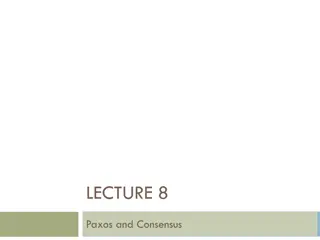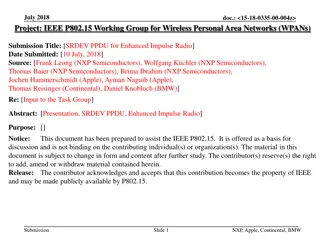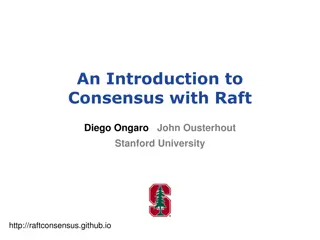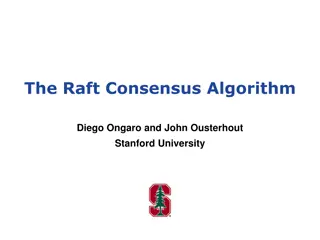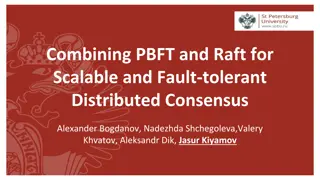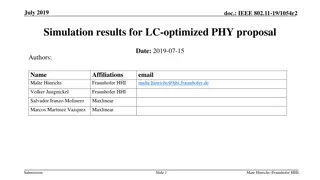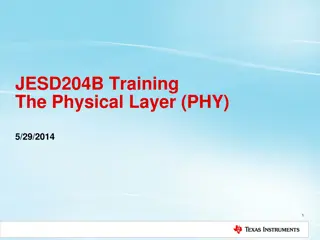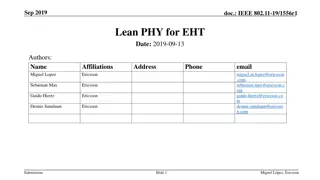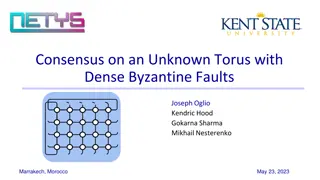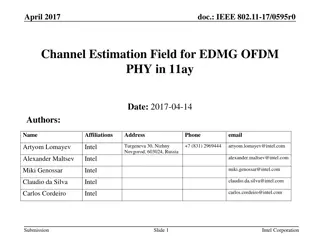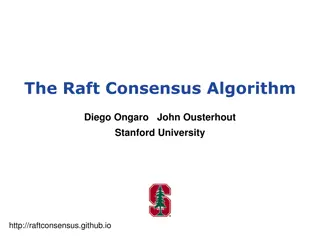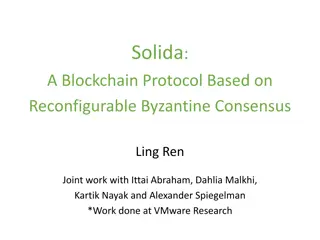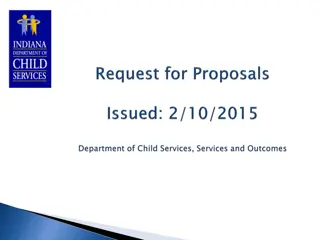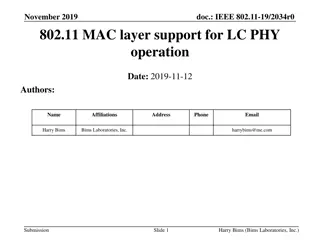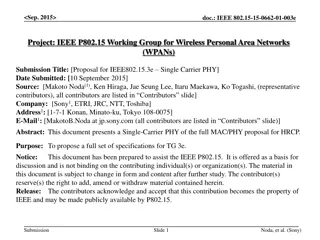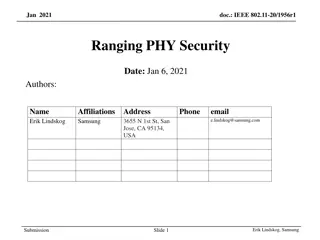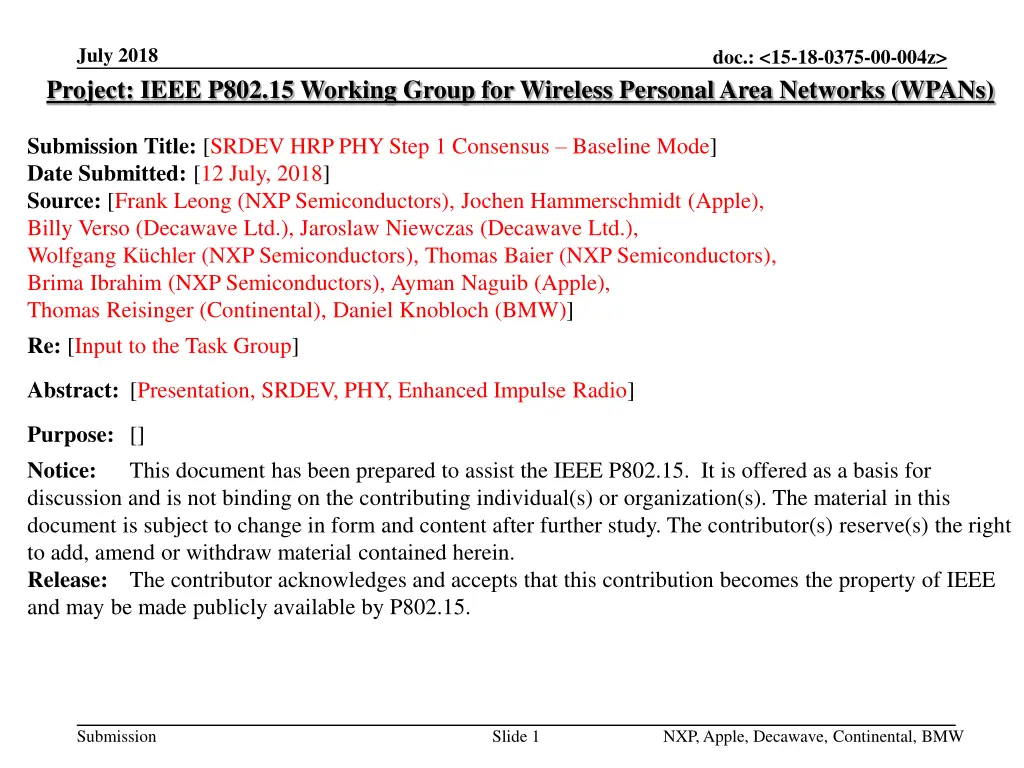
IEEE P802.15 Working Group - Wireless Personal Area Networks Update
Explore the latest developments from the IEEE P802.15 Working Group focusing on Wireless Personal Area Networks (WPANs). This submission discusses enhancements in SRDEV HRP PHY, highlighting modes, consensus baselines, and performance optimizations. Stay informed with detailed insights from key industry contributors.
Download Presentation

Please find below an Image/Link to download the presentation.
The content on the website is provided AS IS for your information and personal use only. It may not be sold, licensed, or shared on other websites without obtaining consent from the author. If you encounter any issues during the download, it is possible that the publisher has removed the file from their server.
You are allowed to download the files provided on this website for personal or commercial use, subject to the condition that they are used lawfully. All files are the property of their respective owners.
The content on the website is provided AS IS for your information and personal use only. It may not be sold, licensed, or shared on other websites without obtaining consent from the author.
E N D
Presentation Transcript
July 2018 Project: IEEE P802.15 Working Group for Wireless Personal Area Networks (WPANs) doc.: <15-18-0375-00-004z> Submission Title: [SRDEV HRP PHY Step 1 Consensus Baseline Mode] Date Submitted: [12 July, 2018] Source: [Frank Leong (NXP Semiconductors), Jochen Hammerschmidt (Apple), Billy Verso (Decawave Ltd.), Jaroslaw Niewczas (Decawave Ltd.), Wolfgang K chler (NXP Semiconductors), Thomas Baier (NXP Semiconductors), Brima Ibrahim (NXP Semiconductors), Ayman Naguib (Apple), Thomas Reisinger (Continental), Daniel Knobloch (BMW)] Re: [Input to the Task Group] Abstract: [Presentation, SRDEV, PHY, Enhanced Impulse Radio] Purpose: [] Notice: discussion and is not binding on the contributing individual(s) or organization(s). The material in this document is subject to change in form and content after further study. The contributor(s) reserve(s) the right to add, amend or withdraw material contained herein. Release: The contributor acknowledges and accepts that this contribution becomes the property of IEEE and may be made publicly available by P802.15. This document has been prepared to assist the IEEE P802.15. It is offered as a basis for Submission Slide 1 NXP, Apple, Decawave, Continental, BMW
July 2018 doc.: <15-18-0375-00-004z> SRDEV PHY Consensus Baseline Mode Note: Notation/nomenclature based on 15-18-0286-01-004z-hrp-uwb-srdev-ppdu-text-contribution.docx Submission Slide 2 NXP, Apple, Decawave, Continental, BMW
July 2018 doc.: <15-18-0375-00-004z> Overall Approach General ( 3, 4.1): Nominal mean PRF 62.4 MHz Require support for CH5 (6489.6 MHz) and CH9 (7987.2 MHz) Distinguish between two enhancement stages: Minimally Incremental Mode ( MIM ) Retain a large number of elements from the existing 802.15.4 PHY Allow re-use of legacy implementations with modest alterations Legacy as basis for inter-operability Performance Optimized Mode ( POM ) Additional signaling and performance enhancements Not in scope of this document Submission Slide 3 NXP, Apple, Decawave, Continental, BMW
July 2018 doc.: <15-18-0375-00-004z> MIM: PRF64 Mode Retain SYNC, SFD, PHR, PSDU fields as per HRP PHY Add Scrambled Timestamp Sequence (STS) field ( 5.3) Three associated frame formats ( 2) SRDEVs shall also support legacy PRF64 frame format (no STS, 6.8 Mbit/s PSDU) (Default, mandatory) (Mandatory) (Optional) Submission Slide 4 NXP, Apple, Decawave, Continental, BMW
July 2018 doc.: <15-18-0375-00-004z> MIM: PRF64 Mode, SYNC No change of SYNC compared to legacy HRP PHY: all specified ternary codes supported as prescribed Submission Slide 5 NXP, Apple, Decawave, Continental, BMW
July 2018 doc.: <15-18-0375-00-004z> MIM: PRF64 Mode, SFD SRDEVs shall support the following binary length-8 SFD pattern enhanced performance for coherent receivers (see 5.1.2) Pattern ---+--+- Nsym 8 SRDEVs shall also support the legacy length-8 ternary sequence, for legacy inter-working support Submission Slide 6 NXP, Apple, Decawave, Continental, BMW
July 2018 doc.: <15-18-0375-00-004z> MIM: PRF64 Mode, PHR SRDEVs shall support legacy 850 kbit/s PRF64 PHR SRDEVs shall support 6.8 Mbit/s PRF64 PHR* PHR content remains unchanged w.r.t. legacy PHR *) Support for 6.8 Mbit/s PRF64 PHR as mandatory under consideration; agreement that it should be included either as mandatory or optional Submission Slide 7 NXP, Apple, Decawave, Continental, BMW
July 2018 doc.: <15-18-0375-00-004z> MIM: PRF64 Mode, STS (I) Mapping of DRBG bits ?? onto STS code ?? as follows (notation as in 5.3.3): ??= 2 ??+ 1, ?? 1,0 ,? = 0,1,2,3, The resulting sequence shall be spread by a factor of L=8 (i.e., ~16 ns inter-pulse spacing) Submission Slide 8 NXP, Apple, Decawave, Continental, BMW
July 2018 doc.: <15-18-0375-00-004z> MIM: PRF64 Mode, STS (II) SRDEVs shall support ????,???????= 16384 2?, with ? = 1 (notation as in 5.3.2, i.e., ????,??????? specified in # of chips) Equivalent to active pulsing STS segment being 32768 chips long (~65 s) Under consideration: optional extension to other STS lengths SRDEVs shall support STS consisting of 1 STS Building Block (notation as in 5.3.2) Under consideration: support for larger number of STS Building Blocks Submission Slide 9 NXP, Apple, Decawave, Continental, BMW
July 2018 doc.: <15-18-0375-00-004z> MIM: PRF64 Mode, STS (III) A segment of active (non-zero) pulsing at the nominal mean PRF is encapsulated by guard intervals, or gaps, of length Lgap in counts of chips. Lgap shall be 512, a guard duration of, roughly, 1 s. All chips during each gap shall carry no signal energies at each respective transmitter. (see 5.3.2) Submission Slide 10 NXP, Apple, Decawave, Continental, BMW
July 2018 doc.: <15-18-0375-00-004z> MIM: PRF64 Mode, STS (IV) STS generated by Deterministic Random Bit Generator (DRBG) based on AES-128 (diagram as shown is revised compared to 5.3.1) 32-bit counter defined Slide 9 defines use of 4096 bits from the DRBG for STS generation, implying N=32, which can be implemented using a 16-bit counter Submission Slide 11 NXP, Apple, Decawave, Continental, BMW
July 2018 doc.: <15-18-0375-00-004z> Conclusion Presented consensus: Minimally Incremental Mode (MIM) Retain a large number of elements from the existing 802.15.4 PHY Allow re-use of legacy implementations with modest alterations Legacy as basis for inter-operability Submission Slide 12 NXP, Apple, Decawave, Continental, BMW

